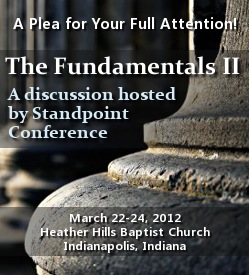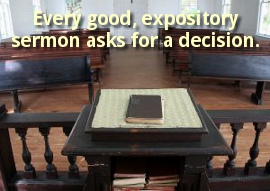Jeremy Sweatt discusses results of new survey of young fundamentalists
Body
- What books have you read recently?
- Who are your favorite authors and what makes their work appealing to you?
- If you had the money and freedom to attend any conference you want, where would you go? About half did no respond to the question.
Discussion
Fundamental Baptist Fellowship International (FBFI) Conference Audio
Body
- The Church: The Pillar & Ground of the Truth -Ed Nelson
- Who Will Be Your King? -John Vaughn
- Hope Deferred -Christopher Williams
- Earnestly Contend for the Faith -Ed
Discussion
Ideas, Not People
 Should SharperIron serve as a place for people to out other people, especially leaders?
Should SharperIron serve as a place for people to out other people, especially leaders?
We don’t have a “final” answer to that question. What we do have is a clear idea of what SharperIron has been about so far and what it’s about right now. It is not about victim advocacy, justice, exposing coverups or holding evil-doers accountable.
Discussion
Book Review - The Sword of the Lord: The Roots of Fundamentalism in an American Family
[amazon 1453843752 thumbnail]
For over 75 years, a small, independent newspaper has been the face of fundamentalism in America. John R. Rice founded The Sword of the Lord in 1934 and continued to manage the paper until his death in 1980. After Rice’s death the fundamentalist movement fragmented and the paper has lessened in influence, although it still represents an old-fashioned, fundamentalist faith.
In a new book released this week, one of John R. Rice’s grandsons, Andrew Himes, takes up his pen to tell the story of fundamentalism from an insider’s perspective. Himes grew up within a leading fundamentalist family in the hey day of American fundamentalism. His book [amazon 1453843752] includes personal encounters with several big names widely known even outside of fundamentalism. Himes tells a story his mom related of Billy Graham moving a piano in their home when he was a sophomore at Wheaton College. On the occasion of John R. Rice’s death, Himes himself attended the funeral and ate a meal afterward with Jerry Falwell, then just embarking on his dream of establishing the Moral Majority, soon to be known as the Religious Right.
Himes traces the roots of the Rice family back to the Revolutionary War and interweaves personal accounts of his ancestors’ lives with an account of the historical background of fundamentalism. He explores the sociological elements of the Scots-Irish people and the Southern mindset during and after the Civil War. His family ended up in Texas, where the Civil War lived on as the great lost cause. Himes also details the beginnings of American evangelicalism and the influence of the 18th century revivals on fundamentalism.
The book is more intriguing when John R. Rice comes on the scene and we hear of his mentor, J. Frank Norris. When William Jennings Bryan died suddenly after the conclusion of the Scopes trial, J. Frank Norris picked up the mantle of the leadership of the fundamentalist movement. Norris’ fights with the Southern Baptist Convention eventually included his young protege, who followed Norris out of the SBC. Himes traces the career of John R. Rice from his early days of evangelistic crusades in various towns in Texas to his national prominence as a leader in fundamentalism and even a member of the National Association of Evangelicals. Rice’s early days included numerous revival crusades in small towns throughout the South. It seems he often built a tabernacle for the meetings, and a few months later would leave behind a new Fundamentalist Baptist Church (they always had the same name), unaffiliated with any convention. Rice eventually took to radio and various newspapers to help expand his reach. He moved to Wheaton soon after he broke with Norris (who seemed to grow jealous of John R. Rice’s influence). Rice then became a mentor for Billy Graham, and the tale of Rice’s painful parting with Graham is told from Rice’s vantage point. We then learn of Rice’s conflict with Bob Jones in the 1970s.
Discussion
Antidote: A Cure for a Common Problem of Evangelicalism and Fundamentalism

The first thing Aaron Blumer (publisher, SharperIron) said to me when we talked about our next conference was “I’m pretty skeptical of the idea of convergence.” Convergence—the idea that fundamentalism and conservative evangelicalism are heading toward, or should be working toward, convergence into one movement—has certainly been what some have perceived Standpoint Conference to be about. We would argue that’s an oversimplification of what we’re about. As our last Standpoint Conference concluded, we made a conscious choice to leave previous issues behind and move on to more critical issues.
Specifically, we believe that fundamentalism and evangelicalism face similar crises. For different reasons, fundamentalism has lurking at its most conservative end some who are less concerned with doctrine than they should be. Evangelicalism has, in the mainstream, those who are also less concerned with doctrine than they should be. On the extreme right of fundamentalism, this expresses itself with a near-obsessive attention to stylistic details that distracts from doctrinal issues. On the left of evangelicalism, church growth, political activism and social influence provide similar distractions.
The alarming result is that both are disengaged from issues that have serious doctrinal consequences. Among those on the far right of fundamentalism, the disengagement results from a feeling that the larger problems of Christianity are irrelevant to them. (“All who are to the left of us are ‘liberals’ anyway.”) Among those on the left of evangelicalism, the disengagement results from a feeling that all must be well because their churches are growing numerically.
Meanwhile, battles are being waged over ideas that represent vast theological shifts. These shifts are happening not just in institutions of higher learning, but in the pews. Rob Bell preaches a form of universalism, and thousands don’t know how to respond—or feel the need to soft-pedal their rejection. N.T. Wright’s New Perspective on Paul is only dimly understood (if at all) by the vast majority of those reading this article. The gay theologians advance their theories and they are uniformly rejected—but few realize that they are using hermeneutical models that are only slightly more radical than the ones taught in our colleges and seminaries. Ground is given, or freedom granted, on the roles of women in leadership, hermeneutics, creation models, eschatological views, all without recognizing that all of the changes are attached to theological structures that mean something and that changes in one area are harbingers of other changes to come—or changes that have already been made in theological viewpoints.
Discussion
Preaching Worth Listening To
 An address to the American Association of Christian Colleges and Seminaries at their annual meeting, Feb. 2006. A PDF version is available at the PTC website.
An address to the American Association of Christian Colleges and Seminaries at their annual meeting, Feb. 2006. A PDF version is available at the PTC website.
Discussion
Shedding Some Light on Conservative Evangelicalism

I grew up in Winston Salem, NC, a city of roughly 230,000. Not large, but by North Carolina standards, in the top five. Over the years, I’ve bumped into people from rural towns who have noted, sometimes with genuine deference, “Oh, you’re from the big city.” This makes me chuckle considering Winston would probably fit inside of Donald Trump’s living room. Our worldview is potently molded to our experiences such that it affects our perception of objective data and propositional truth.
If your experience of the Christian faith has been primarily independent, fundamentalist, traditional and conservative, operating in small to medium-sized churches, then your perception of evangelicalism may be similar to a small town resident visiting a large city. Bigger doesn’t mean better, but it is certainly different with diverse and multiple choices. This is not to denigrate traditional conservatives (whom I have affectionately nicknamed Tracons) or small towns. It is to illustrate perceptual distinctions. Why write about this? Let me explain.
Our church staff and elders attended the Gospel Coalition 2011 conference in Chicago this past week. What we experienced was simple, but profound, gracious, yet powerful. The subject matter, Preaching Christ from the Old Testament, was well crafted and delivered from many regions of the older testament by gifted pastors and leaders. Some of you may have read the updates. While writing the updates and ruminating on the spectrum of participants and contributors at SharperIron, I considered the many articles and comments deliberating the topics of conservative evangelicals, culture, cooperation, fences, separation, etc. It occurred to me that “small town/large city” perceptions exist that skew an appreciation of the believers some have termed “fundagelicals.”

Discussion